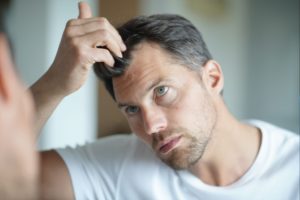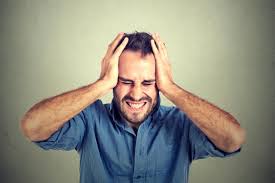
Hair loss is a great indicator of your body’s overall condition. At times, men may think hair loss is a natural part of life, but there are actually underlying causes that could be contributing to unnecessary hair loss. Factors such as stress, a nutritional or hormonal imbalance, diseases, or environmental causes can all be part of the culprit of losing hair.
If you have noticed any level of hair thinning or baldness, finding the root cause is the only way to effectively treat the condition. Hair loss could be a warning sign that your body is using to tell you that something else is happening that needs attention. A hormone imbalance could be the problem. Of course, genetics play a major role in balding but is not the cause in many cases.
Knowing your body well will benefit you not only with your hair but with other symptoms you may be experiencing. This is why knowing your hormonal status is a great way to stay informed about your body. The more you keep an eye on the overall condition of your body, the more you’ll know how to treat any condition that may come up.
In this article, we’ll discuss hair loss, what it is, and why men could be suffering from it. We will cover why a hormone imbalance may be affecting your hairline and what to do about it. We’ll also cover one of the newest, most effective treatments for hair loss, its side effects, and how it works.
Defining Hair Loss
Hair loss seen in men is defined in the medical field as alopecia, which is the thinning of hair on the scalp. Androgenetic alopecia or male pattern baldness is present in approximately 50 million men in the United States, as reported by the National Institutes of Health. Caused by hormones and genetic propensity, hair loss occurs when hair follicles shrink thereby disturbing the growth cycle. With proper treatment, hair follicles can regain their function and return the hair to a normal pattern.
When this happens, hair becomes thinner until all the follicles are dormant and there is no more hair left, presenting as bald spots. High levels of androgens, the male hormones, are responsible for shrinking the hair follicles and shortening the growth cycle, thus making hair fall out faster. DHT (Dihydrotestosterone), which is an androgen, delays the regrowth of new hairs once the old ones fall out as part of the normal growth cycle.
For a free consultation, call (305) 682-1818
Hair Loss Affects More Than Looks
It can be very difficult for a man to make a transition from a full set of hair to having bald spots or going completely bald. This is especially true when the man is only in his 20s. Seeing a receding hairline is a dreadful event that impacts men on a deep emotional level.
The lack of confidence and change in self-image is a real issue that men who experience hair loss have to deal with. Particularly when they have an active career and social life that requires a lot of interaction with people. Hair loss can make a person look older, appear to have less vitality, and diminishes a man’s masculinity. This can be very difficult in competitive environments or the dating scene.
Confidence, of course, comes from the inside, and looks aren’t what is the most important. However, facing hair loss can add a challenging component to anyone’s life. Although it is something you can live with, if there are alternatives to alleviate the condition, it will improve the quality of your life. There are many ways to treat hair loss, and if a hormonal imbalance is a cause, it could be an easy fix to get balding under control.
Modern medicine has solutions for all types of hair loss. When a hormonal imbalance causes this condition, correcting it can bring a lot of hope to men who are facing this difficulty. In addition, having a healthy hormonal balance will also improve other areas of a man’s life. It helps with the overall vitality and regeneration of important physical functions.
Where Do You Fall on the Norwood Scale?
The Norwood Scale is the most popular classification system utilized to measure the level of male pattern baldness. It was designed to provide an easy-to-read reference with images that illustrate the various stages in which balding occurs.
This scale helps physicians determine the extent of hair loss and formulate appropriate measurable treatment options and track their effectiveness. The stages start at level one with minimal hair loss to level seven where you see a significant amount of balding.
It is important for you to catch new hair loss early. The longer you wait, the more difficult it will be to treat hair loss. As soon as you see a difference in your hairline, you should immediately seek help.
Click to contact our specialist today
Hormonal Levels in Men
Hormonal imbalances in men can range from a low level of imbalance to a high level. These variations are due to factors that include age, environment, lifestyle, emotional state, and medical conditions. If you’re asking yourself “can hormone imbalance cause hair loss?” the answer is yes!
Andropause
As a man hits middle age, he will experience andropause, the male version of menopause. Similar to women, he will experience daily or monthly changes in his hormones that will have an impact on his mood, emotions, and biological processes. Although it is a normal part of life to experience changes in hormone levels, it can still be improved with safe and effective therapies.
An aging male body significantly decreases the production of testosterone, which can cause hair loss on the scalp and hair growth in places such as the ears and nose. Lab tests are performed to assess the hormonal balance of the patient and determine if the imbalance is at low or high levels.
Treatments such as Bioidentical Hormone Replacement Therapy (BHRT) is a way to correct the imbalance and provide male patients with overall wellbeing, additionally helping restore hair growth to a healthy pattern. Once you are probably diagnosed, your doctor will be able to decide which treatment plan may work best for you.
Environmental Factors
A decrease in testosterone levels or a rise in estrogen can both contribute to hair loss. Environmental contributors such as plastic containers, air fresheners, cosmetics, or canned foods can all cause a hormonal imbalance.
Other environmental factors include stressful environments and pollution that causes physiological dysfunction. Some environmental causes you may not be able to avoid, but once you examine what goes on around you, it is a good idea to make some changes to your routine to help you stay away from things that may be affecting you.
Lifestyle
Nutrition plays a big role in hormonal balance. For example, too little protein can inhibit the normal healthy growth cycle. The lack of nutrient-dense food from plants can cause a lack of essential vitamins and minerals that contribute to hormonal malfunction. Soy-based products are known to decrease testosterone levels as well as alcohol and processed foods.
Smoking and not getting enough sleep all to play a role in the healthy generation of hormones. Emotional habits are also a contributor to hormonal imbalance. Having long-term depression, suffering from anxiety, or having other mental disorders can disrupt your endocrine system, thus affecting your healthy hormone levels.
Medical Conditions
Certain medications that treat medical or mental conditions are also known to affect the hormonal balance of a person, antidepressants are one example. Diseases such as cancer, gout, high blood pressure, arthritis, and others can contribute to an imbalance in hormones that can lead to hair loss. The hair loss may be temporary as the condition improves, or it could leave permanent damage if left untreated for too long.
Complete a Free Consultation form now
Sign and Symptoms of Hormonal Imbalance
Hormones are chemical messengers that tell tissues and organs how to function. Too much or too little of a specific type of hormone can produce unwanted symptoms that disrupt life. Testosterone has an essential role in the development of men.
Having low testosterone can cause the following symptoms:
- Development of breast tissue (gynecomastia).
- Breast tenderness.
- Erectile dysfunction (ED).
- Hair loss on scalp, beard, or body.
- Hot flashes.
- A decrease in muscle mass.
- Degeneration of bone density as seen in osteoporosis.
- Loss of mental sharpness and focus, difficulty concentrating.
It is important to be aware of your body and notice unusual changes. Sometimes we ignore subtle signs, but paying attention even to small differences will help doctors properly diagnose and treat hormonal imbalances.
Testing and Diagnosing Hormonal Imbalances
A key component of a proper diagnosis is what you report to your doctor. Be sure to have a list of symptoms and how long you’ve had them, plus any medications or vitamins you’re taking.
The doctor may order blood tests to check your thyroid, testosterone, estrogen, and cortisol levels. If needed, more tests may be ordered to further investigate organs such as the prostate or thyroid. Tests are determined by a qualified physician that will put all the pieces of the puzzle together to come up with an accurate diagnosis.
The diagnosis will be based on where the hormonal imbalance comes from. The usual diagnosis for men facing hair loss is a low level of testosterone. Factors such as lifestyle that could be causing the testosterone can be identified and modified. In addition, there are several treatments to help the body’s hormones return to a normal state.
Treatment
Along with making lifestyle changes, hormone therapy for hair loss may be suggested in your case to control the body’s DHT levels. Typically, sufferers of hair loss will be prescribed oral medications such as the popular 5-alpha-reductase inhibitor, Finasteride.
This drug restricts the effects of 5a-reductase, an enzyme that converts testosterone to DHT. Finasteride can help reduce hair loss but side effects may include decreased libido, erectile dysfunction, and inability to ejaculate.
Because of these side effects, our medical team typically opts for less volatile, more effective treatments such as Regenerative Therapy or Bioidentical Hormone Replacement Therapy.
For most, regenerative exosome therapy can be a literal gamechanger. Using tiny messenger proteins, exosomes can not only vastly improve the production of keratin, but it has also been shown to help:
- Improve blood flow to the affected area
- Reduce inflammation
- Trigger new cell and nerve bundle growth (angiogenesis)
- Strengthen the immune system against disease
How to Start Treatment
At our state-of-the-art clinics, expert hair loss physicians will assess your condition and formulate a hair loss treatment plan tailored to your specific needs. We provide different approaches to hormonal imbalances that may be causing your hair loss.
We also combine therapies to provide the maximum results for our patients. Call us today for more information and to schedule a free consultation. Our dedicated team will answer all your questions and provide excellent service every step of the way. Call us at 305-682-1818 today.
References
- https://en.wikipedia.org/wiki/Hair_loss
- https://www.medicinenet.com/hair_loss/definition.htm
- https://www.healthline.com/health/norwood-scale
- https://www.healthline.com/health/hormonal-imbalance#signs-or-symptoms
- https://www.nps.org.au/medicine-finder/finasteride-1mg-tablets
Call or text (305) 682-1818 or complete a Free Consultation Form








